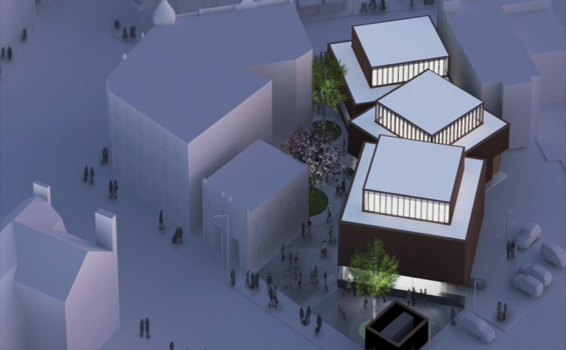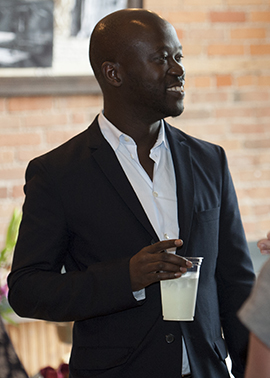The Colgate University Board of Trustees has given final approval for project costs to build a new Center for Art and Culture (CAC) in the Village of Hamilton. The $21-million center — designed by renowned architect David Adjaye — will feature a new 17,000-square-foot structure consisting of three connecting “volumes” that will be used as flexible and spacious galleries. A sculpture court and walkway will connect Utica and Madison streets to the site, which will be in the space formerly occupied by Parry’s hardware store (18-20 Utica Street), across the street from the Colgate Bookstore. Ample parking will be ideal for attracting visitors, residents, and members of the Colgate community.
Trustee approval came during the board’s winter meeting last weekend, and included authorization to purchase property at 22 Utica Street, which had been listed for sale privately by the owner. Currently home to the Utica Street Café, this building will connect to the CAC and will house a community room, CAC offices, and a new café.
Douglas Hicks, dean of the faculty and provost at Colgate, said, “The Center for Art and Culture is a prominent feature in Colgate’s 2014–2019 strategic plan. This Adjaye-designed building and the exhibitions it will host will be a tremendous educational resource for Colgate’s curriculum and for the Hamilton and wider communities.”
Plans for the new CAC began in 2011, followed by board approval of the concept and the hiring of David Adjaye & Associates to envision a distinctive design. Since joining Colgate in 2013, Anja Chávez, director of university museums, has been planning for the relocation of works from Colgate’s Picker Art Gallery and Longyear Museum of Anthropology from campus to the new center
“Relocating our museums is a monumental task,” said Chávez. “Every day we come closer to opening a very special cultural space that will be welcoming and accessible to everyone.” She said the center will ensure the long-term stewardship of Colgate’s collections and also provide hands-on access to the art for research and study. “Students from many disciplines also will have the opportunity to curate exhibitions there and to learn from the museum’s professional staff and from Colgate’s faculty,” she said.
Crucial financial support and expertise for the project have come from Nancy Crown P’10, member of Colgate’s board of trustees, and Mark Falcone ’85, P’12, a trustee emeritus.
Crown is a trustee at the Whitney Museum of American Art in New York. She also is a trustee at the Museum of Contemporary Art Chicago where she has helped lead the charge for arts education in that city. “Colgate has a strong tradition of experiential learning,” Crown said. “The Center for Art and Culture will not only greatly enrich Colgate as a learning institution, but also the greater Hamilton community and region. It also will encourage students and members of the community to engage with art, asking important questions and responding to a wide variety of works and ideas. These are crucial life skills, not only for museum and university environments, but throughout one’s life.”
Falcone, who chairs the CAC board of advisors, has a personal and professional passion for art and the ways it connects people and cultures. As a trustee of the Museum of Contemporary Art Denver, he led the way in 2003 for construction of a new permanent home for the museum. He said, “With inventive programming, the CAC will be a powerful tool for exploring art and culture in growing parts of the world such as East Asia, Africa, and South America. Schoolchildren, residents, and visitors to the region all will have full access to these new experiences and educational possibilities.”
The CAC — which is projected to have an estimated annual economic impact of $4 million in the community and create many jobs in central New York — recently received a $750,000 grant from the Central New York Regional Economic Development Council. When construction begins this summer, Colgate’s Thought Into Action Institute, which has been temporarily located in the Parry building, will again hold its activities on campus.
Carolyn Gherardi, owner of 22 Utica Street Café, is pleased with her transaction with Colgate. “It’s really a win-win,” she said. “Not only will the center be great for the community and the region, but also, I’m proud that I helped introduce this space as a café, and that people will continue to enjoy it that way.” The 22 Utica Street Café will remain open through June.
Colgate has hosted several open forums throughout the CAC planning process. The next one, to update the community on recent progress, will be held on February 9 at 7 p.m. in the Green Room at the Colgate Inn. Dates for future forums will be announced.


